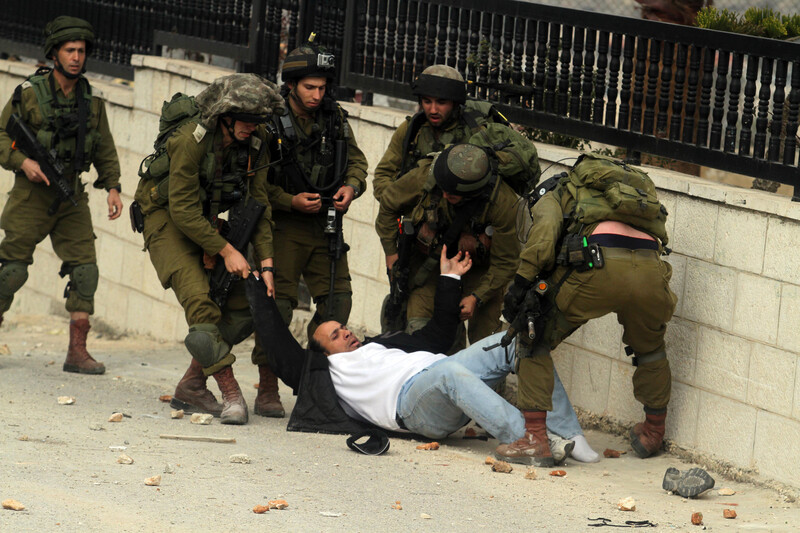Rights and Accountability 28 February 2014

Israeli soldiers seize a Palestinian man in Jalazoun refugee camp earlier this month.
APA imagesEvidence suggests that Israeli occupation forces in the West Bank, including East Jerusalem, are guilty of “wilful killings, which would amount to war crimes,” according to a new report published by the human rights group Amnesty International.
The report – “’Trigger-happy’ Israeli army and police use reckless force in the West Bank” – documents Israel’s excessive killings and brutalization of Palestinians in the West Bank over a three-year period. From January 2011 through December 2013, as a result of Israeli forces’ use of live ammunition, 41 Palestinians were killed, and at least 261 were injured.
Among those killed by live ammunition was 15-year-old Saleh Amarin, who was shot in the forehead by an Israeli soldier near his home in Aida refugee camp (near Bethlehem) on the afternoon of 18 January 2013.
One witness told Amnesty International that there was no stone throwing taking place at the time:
[The soldiers] went back in and went up the sniper towers. But when I was standing there near the [entrance of the camp] there was nothing much happening. Then I heard a single gunshot and I saw Saleh Amarin fall. Then I saw young men run towards him and try to carry him. He fell out of their hands the first time, then they got a grip of him and took him away.
The report notes that “even if he had intended to throw, or in fact succeeded in throwing, a stone, he would have posed no threat to the lives of Israeli soldiers who were inside a fortified military base with observation towers.”
This is only one of dozens of harrowing stories documented in the report.
“Non-fatal” weapons kill
Israel often defends its assaults on protests in the occupied West Bank, including East Jerusalem, by pointing to its use of so-called “non-fatal riot dispersal means” – beatings, tear gas, stun grenades, skunk water and rubber-coated steel bullets, among others.
These weapons, however, severely injure Palestinians and are often fatal.
Two Palestinians were killed by rubber-coated steel bullets last year. In December 2011, another was killed after being shot in the face with a tear gas canister at point-blank range.
On 1 March 2013, Mahmoud Awad, 26, was shot in the back of the head by a rubber-coated steel bullet near Israel’s Qalandiya military checkpoint between Jerusalem and the West Bank city of Ramallah. He died as a result of his injuries eight months later.
Citing statistics provided by the United Nations Office for the Coordination of Humanitarian Affairs, the report also observes that more than 8,500 Palestinians were injured by “weapons other than live ammunition between January 2011 and December 2013.”
From that total, over 1,500 were children.
In late September 2013, six-year-old Mousab Sarahnin lost his eye after an Israeli soldier shot him in the face with a rubber-coated steel bullet in Fuwwar refugee camp, as Dylan Collins and I reported for The Electronic Intifada at the time.
Targeting journalists and others
Amnesty International also documented several cases of Israeli forces directly targeting journalists, human rights defenders and medics.
Mohammad al-Azzah, 23, is a freelance journalist from Aida refugee camp. He was shot in the face with a rubber-coated steel bullet on 8 April 2013. Israeli forces confronted him as he took pictures of them clashing with Palestinian youth in the camp. After al-Azzah noticed that a commander was repeatedly pointing at him while speaking to other soldiers, he became worried:
I decided to stop photographing and go home. I closed the window, then came back to close the door, and one soldier shot directly at me. I saw the shot leave his gun … the bullet hit me in the right of the face and penetrated inside. I screamed, and my colleague, who was also working late, came running to me. He took me down the stairs and called an ambulance and then tried to call someone to get a car. When he opened the door to take me out, the soldiers shot at the door. He yelled at the soldiers that they had killed me, and then decided to take me through. We ran out of the building for 150 metres. Then a neighbour came and took me to al-Hussein hospital.
Al-Azzah hid for two months, staying with friends and relatives, because Israeli forces were searching for him. He was eventually arrested during a night raid on his home, and an Israeli military prosecution subsequently issued him charges related to incitement.
The report documents several more cases of Israeli forces injuring journalists and human rights defenders, most notably in places such as the village of Nabi Saleh, where soldiers fired tear gas canisters into homes of well-known activists on several occasions.
Elsewhere, medics have been shot with rubber-coated steel bullets and foam-tipped bullets on several occasions.
Impunity
Though Israel’s culture of impunity surrounding military and settler violence against Palestinians is nothing new, the report observes that
UN agencies, local and international human rights groups and others have documented a pattern of war crimes and other serious violations of international law – both international humanitarian law and international human rights law – committed by Israeli military and security forces since they occupied the West Bank, including East Jerusalem, and the Gaza Strip in 1967.
Amnesty International goes on to stress that Israeli soldiers and officers, if investigated at all, generally go unpunished for killing or injuring Palestinian civilians, even when they do so in violation of Israel’s own legal system. It points to Israel’s long history of “flawed investigations” when looking into violations.
The report concluded by calling on the international community to suspend all weapons transfers to Israel “until substantive steps have been taken by Israel” toward accountability for previous crimes and to prevent future violations of international humanitarian law and international human rights law.
This should include “munitions, weapons, and related equipment including crowd control weapons and devices, training and techniques.” Amnesty International called on the United States, in particular, to pay heed to this call.
Yet given the US track record of supporting, financing and protecting Israel’s systematic violations of international law and Palestinian rights, it is likely this call will fall on deaf ears.





